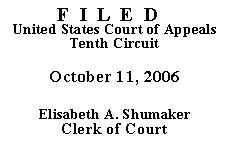

| UNITED STATES OF AMERICA,
Plaintiff-Appellee, Defendant-Appellant. |
No. 05-3215
(D.C. No. 04-CV-3371-SAC) (D.C. No. 01-CR-40087-SAC) (Kansas) |
Mr. Mendenhall was sentenced as a career offender under U.S.S.G. § 4B1.1(a) after pleading guilty to two federal drug charges. On direct appeal, he challenged the district court's application of the career offender provision, asserting that his two prior state court convictions were related to one another and should not have been counted separately to bring him within the ambit of guideline section 4B1.1(a). We disagreed with Mr. Mendenhall's position and affirmed the district court. See United States v. Mendenhall, 67 Fed. Appx. 565 (10th Cir. 2003).
In his § 2255 petition, Mr. Mendenhall presented the sole argument that the sentencing court's application of the career offender provision violated his Sixth Amendment rights pursuant to Blakely v. Washington, 542 U.S. 296 (2004), and United States v. Booker, 125 S. Ct. 738 (2005). The district court denied his petition and did not rule on his application for a COA.
We may issue a COA only "if the applicant has made a substantial showing of the denial of a constitutional right." 28 U.S.C. § 2253(c)(2). "A petitioner satisfies this standard by demonstrating that jurists of reason could disagree with the district court's resolution of his constitutional claims or that jurists could conclude the issues presented are adequate to deserve encouragement to proceed further." Miller-El v. Cockrell, 537 U.S. 322, 327 (2003). When a court dismisses a habeas petition on procedural grounds, we may issue a COA only if "jurists of reason would find it debatable whether the district court was correct in its procedural ruling." Slack v. McDaniel, 529 U.S. 473, 484 (2000). We must therefore review the claims in Mr. Mendenhall's habeas petition and make a general assessment of their merits. Id. at 336. However, we are not required to engage in a full inquiry as to the "factual or legal bases adduced in support of the claims. In fact, the statute forbids it." Id. Mr. Mendenhall is not required to prove the merits of his case to obtain a COA, but he must demonstrate "something more than the absence of frivolity or the existence of mere good faith on his . . . part." Id. at 338 (internal quotations and citation omitted). With these principles in mind, we have carefully reviewed Mr. Mendenhall's brief, the record of these proceedings, and the district court's order.
The district court denied Mr. Mendenhall's motion on two different grounds. It first concluded that the sentencing court's use of the career offender provision did not violate Mr. Mendenhall's Sixth Amendment rights because Booker expressly confirmed the rule established in Apprendi v. New Jersey, 530 U.S. 466 (2000), that the fact of a prior conviction need not be submitted to a jury or proved beyond a reasonable doubt. See Booker, 125 S. Ct. 765. Therefore, it was appropriate for the sentencing court to decide whether prior convictions were related for purposes of the career offender guideline.
The district court then noted that Mr. Mendenhall could not succeed on his petition in any event, because Sixth Amendment Booker claims can only be raised in "cases on direct review." Booker, 125 S. Ct. at 769. See also United States v. Bellamy, 411 F.3d 1182, 1186-87 (10th Cir. 2005) (holding neither Booker nor Blakely can be applied retroactively); United States v. Prince, 400 F.3d 844, 849 (10th Cir. 2005) ("Blakely does not apply retroactively to convictions that were already final at the time the Court decided Blakely, June 24, 2004."). Therefore, the court held it could not retroactively apply the rule announced in Booker to Mr. Mendenhall's request for collateral review.
We have reviewed the district court's order in light of the standards laid out in Miller-El, and conclude that reasonable jurists would not find debatable the grounds upon which the court denied Mr. Mendenhall's motion. Accordingly, we DENY Mr. Mendenhall's request for a COA and DISMISS his appeal.
SUBMITTED FOR THE COURT
Stephanie K. Seymour
Circuit Judge
*.This order is not binding precedent, except under the doctrines of law of the case, res judicata, and collateral estoppel.